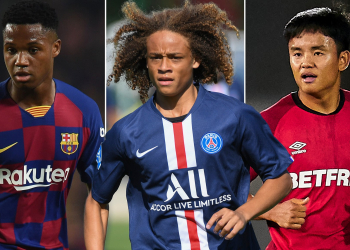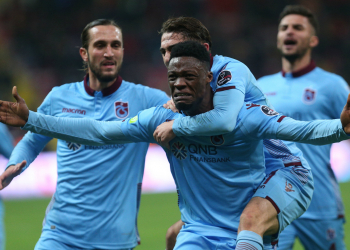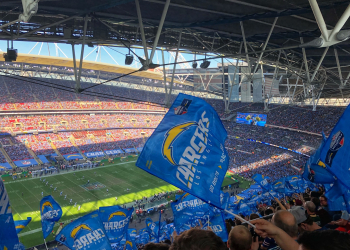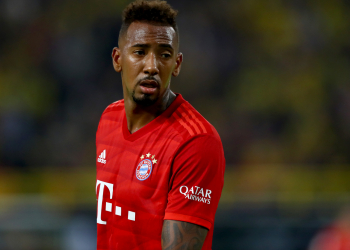Born in 1974, Opoku had been around some by his eighth birthday, having lived in at least two continents and three countries – Scotland where he was born; Ghana and Nigeria where his family re-located – and studying at university-operated primary schools in the cities of Kumasi and Ibadan.
In 1988, a 14-year-old Opoku returned to his native Ghana, continuing his secondary education at St. Hubert’s Seminary and Kumasi High School, both in Ashanti, and successfully gained admission at the Kwame Nkrumah University of Science and Technology (KNUST), but only on the second time of asking.
After a year spent studying for a diploma in Data Processing, he switched to seek and complete a degree programme in Computer Science, bringing to a climax a somewhat convoluted educational circuit.
Opoku’s early years had not passed without incident, however. A year after his family’s return to Ghana (from Nigeria), his mom, Madam Dora Opoku, passed away tragically. Opoku discusses her almost teary-eyed and not without a hint of nostalgia that has hardly faded with time.
“She was a massive influence on my life and it is because of her that my sister and I are Christians today. My mom was a special woman and I guess my one regret is that she is not alive today to see my family and what I have become. She was also a disciplinarian like my dad, and that is one reason why I have stayed principled all my life.”
The conversation soon moves to a subject less grim: his days at Kumasi High School.
While Opoku readily admits he was not so good at the sporting disciplines while in school – the most he did was unsuccessfully try his hands at goalkeeping – his passion for them could hardly be faulted, as he indulged them in what ways he could.
He recalls: “I would always try to go for Inter-Schools athletics competitions and follow the Kumasi High School football team for matches.”
‘I started out on radio, did TV, and moved into print. I believe that is what makes you a complete journalist and, thankfully, I do a fair job at all three’
There was more to young Opoku’s sporting adventures than mere spectatoring, though, as he reveals.
“I probably should have realised that I was to become a journalist because I used to write articles and paste them on the notice wall of the Dining Hall at KUHIS about the football games I attended.”
For one whose journalistic instincts had been honed albeit unwittingly while yet so young, Opoku’s choice of study at tertiary level was quite unusual. On face value, the fields of Computer Science and soccer could not have been more distant from each other, yet Opoku, ever so observant, does not fail to spot and highlight the subtle parallels.
“Mathematics (a sine qua non for any computer scientist) was one of my strongest areas and so I always loved working with statistics. Maybe that is why I am able to retain so much information in my head as a football commentator and memory retention is one of my biggest assets in my job. Attention to detail (another forte for people of Opoku’s professional field) is also something I do because of that discipline I offered,” he notes.
Observing him going about his work as meticulously and professionally as could be, it isn’t hard to see his point. His has, indeed, been a sparkling journalistic career. And yet, as he explains in detail, it all began rather unexpectedly, almost as if by accident. Listen to him tell it as it happened: “After my first year at KNUST, I wanted to travel abroad like my friends to do holiday work before starting my second year of schooling but those plans fell through. So I was teaching part-time at a computer school in Kumasi when LUV FM began operations in Kumasi.
“Before then, during the holidays, Garden City Radio asked for people to audition for possible jobs there. I actually went there and read a script and was asked to come back at a later date which, unfortunately, never materialised because I wasn’t contacted. Later, a friend of mine who was working there at the time asked me to try out for the news department. So one day I went to the radio station and spoke to the then news editor, Peter Ofoe Diogo. When I told him I wanted to join the news team as a reader, he told me that there was no money to pay me.”
“I told him that since I had no prior experience, I was prepared to learn on the job and so I understood if there was no money to pay me. So he asked me to come in the following Monday, since it was on a Friday that I went there. I went there and I was made to read through scripts in the mornings, but not on air, before going to the computer school for my classes in the afternoons.
This continued for the whole week until Friday, when Ofoe Diogo suddenly handed me a script and asked me to read the 10 o’clock news on radio,” he remembers. “He accompanied me into the studio and I did so. That brought out some senior members of staff to find out who I was. I also did the 12pm news and went off for my classes. Interestingly enough, I was struck down by malaria and so I had to stay at home the following week. During that time, LUV FM advertised on air for a sports presenter and asked for all those interested to present demos.”
“I was broke so I did not, but told myself that when I recovered and went back to LUV FM, I would continue to work in the news department even though I was very interested in doing sports presentation. When I recovered, I went back and again did two news bulletins. After the second one, the then Controller of Programs, Cox Tamakloe, called me into his office and asked me whether I was interested in applying to be a sports presenter.
I said yes and so he asked me to understudy the sports presenter on the morning show at the time, Henry Amankwaa. I did so the following day and prepared to do the presentation the following day with Henry on the morning show. It was the morning show host at the time, Seth Opoku Opare who nicknamed me Christopher Columbus just before I went on air. So that was how I started. After my debut presentation, the then programmes manager, Dusty Wayne (of blessed memory) offered me a part-time job as a sports presenter, and that was it.”
Well, since that day in August 1998, Opoku has barely looked back or relaxed, bar a three-month hiatus in
“My mom was a special woman and I guess my one regret is that she is not alive today to see my family and what I have become”
2001 as well as a two-year period (2004-2006) when he was away from the country.
Opoku has risen to become one of Ghana’s most recognizable media faces and voices. Listen to him run commentary, watch him engage in punditry on TV, or read any of his write-ups, and it is almost impossible to determine which art he handles most proficiently. No need to, though, in Opoku’s opinion.
“I think I have adapted to all three very well,” he proffers with a wide smile. “I started out on radio, did TV, and moved into print. I believe that is what makes you a complete journalist and, thankfully, I do a fair job at all three.”
Nevertheless, it has not been all rosy for Opoku in his career. As he readily admits, there have been a few rough incidents, especially during his early days on radio while he learnt the ropes of the job. Two readily come to mind.
“I remember running commentary in Koforidua at a league game between Asante Kotoko and Suhum Maxbees. At the time, Hearts of Oak were playing away to Dawu Youngsters. I was misinformed by someone that Dawu had taken the lead against the Phobians and I recall saying loudly on air that unconfirmed reports had it so. As was later related to me, the joy that report sparked among Kotoko fans back in Kumasi was simply rapturous, only to realise not long thereafter that Hearts were in the advantage. Unfortunately, I cannot share the obvious repercussions I suffered for that gross error, but I certainly learnt lessons from that.”
As if that episode was not embarrassing enough, there also occurred an occasion when Opoku, in delivering a dose of foreign sports news on radio, mentioned Italian legend Roberto Baggio as being involved in a serious car accident and his vehicle “sustaining serious injuries.”
Opoku laughs, even as he recalls these absolutely amusing incidents, yet he is quick to point out that they have indeed helped him pay a lot more attention to what he does.
And while he might have lost count of just how many games he has seen in the course of his work, having been at it for so long, a couple of distinguished individual performances he has witnessed clearly stands out. He recounts two of the most memorable, incidentally involving two former Asante Kotoko stars.
“The first was Baba ‘Armando’ Adamu’s first game for Kotoko in Kumasi, against GHAPOHA. Kotoko won 3-0 and Adamu was simply brilliant on the day. The other was Charles Taylor’s first league game for Kotoko against Tano Bofoakwa in Sunyani. He scored a brilliant individual goal and linked up so well with Isaac Boakye that I remember saying he made the then GH¢125,000 record transfer fee paid for him by Kotoko seem ridiculously cheap.”
As a journalist, Opoku has covered a host of major international tournaments, including the African Youth Championships hosted (and won) by Ghana in 1999, the Nations Cup organized a year later, and that of 2008. He laments, though, never having covered a Fifa World Cup, missing the 2006 and 2010 editions due to his absence from the country and his wife’s scheduled delivery respectively.
Surely, he would love to make an appearance at Brazil 2014 should Ghana qualify, no?
“Yes, I would love to,” Opoku replies, “but in the end, it is all about opportunities. I just hope God makes a way for me. I can only dream, pray and hope.”
There’s more to Christopher Opoku’s story, though. Watch out for part two on Friday.
Christopher Opoku’s career in television commentary, for which he is probably best known, has seen him work with a host of co-commentators, of whom he singles out two for special praise: dreadlocked coach-turned-journalist Nana Agyemang whose astute tactical and technical knowledge our interviewee acknowledges to have benefitted greatly from, and GBC prospect Benjamin Willie Graham who Opoku describes as “potentially one of Ghana’s best commentators one day without a doubt.”
There are a few other journalists who Opoku regards in a similarly elevated light but in slightly different capacities: veterans Moses Foh Amoaning and Karl Tufuor as good friends and mentors; the likes of Gary Al-Smith, Jerry Ayensu, Godfred Akoto Boafo, Nathan Quao, Albert Ababio and Sammy Bartels as “talented individuals who he feels privileged to have worked with and all of whom have gone on to great things” and England’s Martin Tyler as the one commentator in the world he’d be absolutely delighted to team up with in the press box.
“RABBLEROUSER”
Over the years, Opoku has moulded a characteristic style for himself; an occasionally abrasive, say-it-as-it-is approach that hardly pleases everyone and has seemingly earned him more abuse than plaudits. Little wonder, though: his current Facebook profile describes him, among other things, as an “official rabble-rouser” and the 38-year-old regularly strives to live up to that tag, much to the displeasure of some. Opoku couldn’t care less, though.
“I deem it a part of the job,” he says with much pride. “And I wouldn’t change for anything, because I have retained respect from even those who would attack me verbally in public. So, sorry critics – I’m not changing anytime soon in that regard.”
Opoku’s style appears especially daring, even commendable, in an era when Ghanaian journalists face considerable challenges with respect to free speech and access to credible information, as he himself explains in some detail.
“There is a lot of intimidation from the powers-that-be when you are a journalist who tries to be objective. Sometimes you face threats and temptation. Some will try to buy your silence and others will simply refuse to speak with you. I just think as journalists we should not bow to the whims and caprices of such people for that is the only way a good reputation can be built.”
Rather than feel victimized, however, Opoku considers his work fairly appreciated, if the awards he won as Best Football Commentator and Best Football Journalist (PLB) in 2008 and 2009 respectively are anything to go by.
CANCER
Almost a year ago, Opoku suffered what might well be considered the worst episode in his life, probably even worse than being bereaved of his mother several years prior. Just when he appeared to be savouring the joys of his chosen profession and enjoying life as a family man, a diagnosis of rectal cancer – of the malignant sort – hit him hard almost out of nowhere, and at a time his wife was heavy with the couple’s third child. Cancer, after all, hasn’t ever been the easiest foe for anyone to contend with. It has taken down many, and Opoku, fully conscious of that fact, quite reasonably feared the worst.
“My whole world was shattered,” Opoku says, with the visible chill with which he originally received the news. “Eventually I did the CT scans and my sister flew down to Accra so she could accompany me to see the surgical consultant. Before then, we wanted a second opinion and so I went to Kumasi to have a second colonoscopy. We later went to see a consultant in Accra who confirmed our worst fears, and recommended an urgent surgery to rectify the condition.”
And so it happened that, on September 24, 2012, Opoku went under the knife at the Komfo Anokye Teaching Hospital, but not without a great deal of hesitance for obvious reasons. The surgery did prove successful, though, but Opoku still had to endure several months of post-surgery therapy until he attained full recuperation sometime this year.
Partially to aid his recovery, Opoku had to make the tough decision of resigning from then employers Optimum Media Prime (OMP) and, just when he felt he might have to endure the life of a jobless man/family head for a while, broadcast houses MultiTV and [later] GTV came asking. Opoku, ever the religious man, attributes those timely employment opportunities to “the hand of God.”
I wouldn’t change for anything, because I have retained respect from even those who would attack me verbally in public. So, sorry critics – I’m not changing anytime soon in that regard
Opoku, of course, is wholly hale and healthy now and going about life as before, yet he would be the first to admit he wouldn’t have been able to make it through the hard times his illness ushered all on his own. And so he draws a long list of people to whom he believes he owes considerable degrees of appreciation, a few of whom get a mention here:
Vivian, his long-suffering spouse who stuck with him even while she endured labour pains herself; Dr. Joseph Yorke (KATH), who operated on him; his sister, herself a medical doctor; Michael Katahena, a colleague journalist; editors William Selasi Adjagogo and Theophilus Yartey of the Business and Financial Times; the staff manning the sports departments of Happy FM, MultiTV and GTV, among others.
For all his sickness-induced troubled experiences, though, Opoku believes he has only emerged stronger, determined to soldier on for all the reasons for which he is alive today.
MUSIC
Football aside, Opoku’s other lifelong passion is music – of the gospel genre, to be precise – a gift he believes was sub-consciously bequeathed to him by his deceased mum. Sometime ago he launched a nine-track album, entitled ‘Oye Mame’.
It didn’t exactly disappoint, did it?
“Not really,” he opines. “I’m yet unsure just how successful it [the album] was but, whatever the case, that is another part of my life people don’t really know about. As I mentioned earlier, my late mum – a singer – was an influence on me and so I naturally love to sing. I was a member of the KNUST Mass Choir during my time on campus and I have directed a few choirs in my time. If there is anything I love doing apart from football journalism, it certainly is music in church.”
GHALCA
Barely two months ago, Opoku picked up an appointment as Administrative Secretary of the Ghana League Clubs Association (Ghalca), and has busily been at it since. As he willingly concedes, though, operating in that capacity throws him right into Ghana football’s corridors of power, of which, as has already been explained, Opoku has been a committed yet constructive up braider of. Surely, he cannot anymore be as outspokenly critical of the system as he once was, can he?
“Well, honestly, I wouldn’t to some extent. I have already been told that it means I do not have a personal opinion anymore but I vehemently disagree with that. What it simply means is that I can no longer be publicly critical of Ghalca, since I am running the office now, but I will have to turn things around there. But that is it really. I will continue to be as objective as possible because at the end of the day, it is my reputation that means so much to me. So other issues that are non-Ghalca issues will be stuff that I will continue to comment on.”
Well, then, it seems the ‘rabblerouser’ hasn’t yet been robbed of his bite yet?
ALLEGIANCES
At this point, Goal asks which local football club is Opoku’s favourite, but he wisely steers clear of that subject, citing “personal reasons.” Like most Ghanaian journalists worth their salt, that -the identity of his preferred domestic outfit- is perhaps Opoku’s best-kept secret, and for good reasons.
He has no objections disclosing where his allegiance lie, however, with respect to European football. His choice, when he reveals it, is quite unambiguous: England’s Liverpool.
For those who follow Opoku’s sports-related tweets and posts on social media, though, that isn’t much of a surprise. As it turns out, Opoku’s love for the Reds springs from that day in 1984 when he watched them play AS Roma live in the European Cup final. He recounts the occasion with some nostalgia:
“I was almost 10 at the time. That is when I fell in love with the club and I remain a full supporter of the team, through the good and bad times.”
FINAL WORDS
To round up our interview, Goal inquires from Opoku just how he would like to be remembered when he finally departs the scene of Ghanaian football press.
“Well,” he replies, “if I can be recalled as someone who not only made a positive impact on our football, but helped bring others up as well, there could be no satisfaction greater.”
On the face of it all, one could only wonder if that desired legacy isn’t already starting to fall in place.
Join GhanaStar.com to receive daily email alerts of breaking news in Ghana. GhanaStar.com is your source for all Ghana News. Get the latest Ghana news, breaking news, sports, politics, entertainment and more about Ghana, Africa and beyond.




